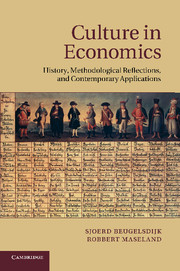Book contents
- Frontmatter
- Contents
- List of figures
- List of tables
- List of boxes
- Prologue
- Part I History and methodological reflections
- 1 Defining culture
- 2 How culture disappeared from economics
- 3 Explaining the rise of culture in modern economics
- 4 Culture in economics: contemporary theoretical perspectives
- 5 A methodological perspective on culture in economics
- Part II Contemporary applications
- Part III Evaluation
- References
- Index
4 - Culture in economics: contemporary theoretical perspectives
Published online by Cambridge University Press: 04 February 2011
- Frontmatter
- Contents
- List of figures
- List of tables
- List of boxes
- Prologue
- Part I History and methodological reflections
- 1 Defining culture
- 2 How culture disappeared from economics
- 3 Explaining the rise of culture in modern economics
- 4 Culture in economics: contemporary theoretical perspectives
- 5 A methodological perspective on culture in economics
- Part II Contemporary applications
- Part III Evaluation
- References
- Index
Summary
Introduction
In Chapter 2 we have seen how culture and economy got separated theoretically, resulting in the disappearance of culture from the economic lexicon by the mid-twentieth century. Chapter 3 provided reasons for the return of interest among economists in the role of culture in recent times. In this chapter we continue this discussion by assessing the various ways in which culture may enter economics.
Attempts at integration of culture and economics broadly fall into four categories, as illustrated in Table 4.1.
First, there is a literature in which the economic model of behavior is basically maintained, with culture being added as an exogenous factor explaining what the economic model by itself cannot. We refer to these approaches as “Economy and Culture.” We discuss this literature in Section 4.2. Second, there is a literature which can be said to bring together culture and economics by analyzing both economy and culture from a cultural perspective. Many people have argued, for example, that economic rationality is an historically and culturally specific phenomenon, rather than a universal behavioral structure. In this interpretation, a society's economy is just one of many aspects of the overall culture of that society. If the economy is a manifestation of culture, it follows that it is to be analyzed by cultural sciences rather than that it requires a discipline of its own. This line of thought, which we denote “Economy as Culture,” we will discuss in Section 4.3.
- Type
- Chapter
- Information
- Culture in EconomicsHistory, Methodological Reflections and Contemporary Applications, pp. 85 - 118Publisher: Cambridge University PressPrint publication year: 2010



